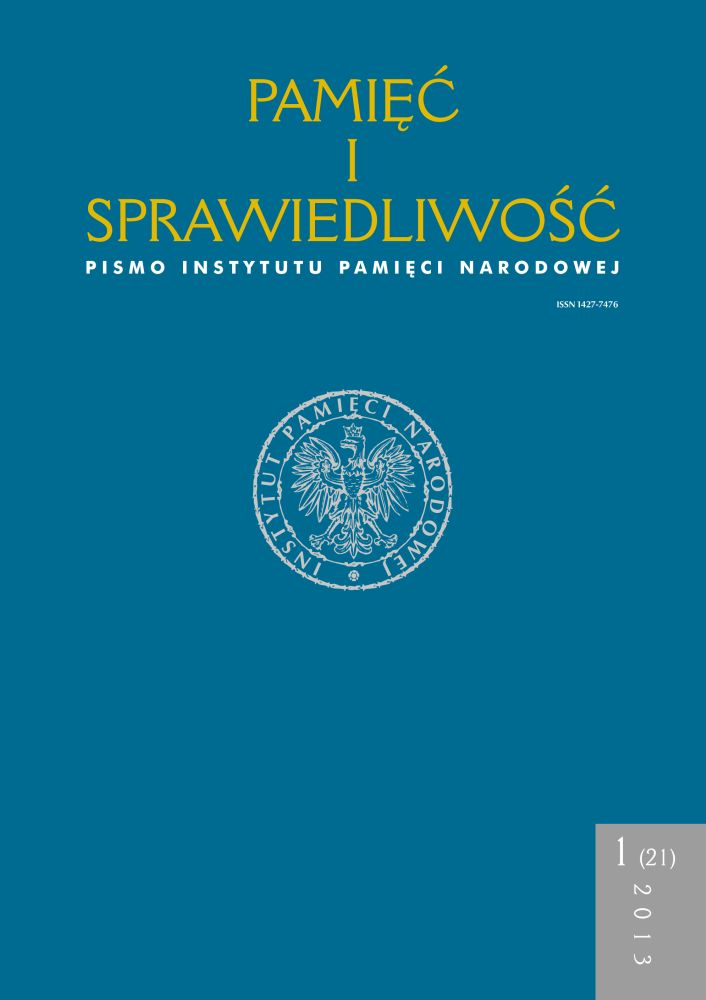Okręgowa Komisja Badania Zbrodni Hitlerowskich w Gdańsku w latach1965–1989. Geneza i działalność
The District Commission for the Investigation of Hitlerite Crimes in Gdańsk in the years 1965–1989. Origins and activity
Author(s): Łukasz JasińskiSubject(s): History, Recent History (1900 till today), Post-War period (1950 - 1989)
Published by: Instytut Pamięci Narodowej
Keywords: The District Commission for the Investigation of Hitlerite Crimes in Gdańsk; GKBZHwP
Summary/Abstract: The main institution responsible for the investigation, documentation and prosecution of crimes committed during World War II was the Central Commission for the Investigation of German Crimes in Poland (from 1949 known as the Central Commission for the Investigation of Hitlerite Crimes – GKBZHwP). The aim of this article is to analyze the functioning of the District Commission for the Investigation of Hitlerite Crimes in Gdańsk (OKBZH), which constituted a division of GKBZHwP in Poland. The Pomeranian micro scale provides thebackground for the analysis of the methodology of work of the said institution and reflects the mechanisms and scale of its dependence from the Central Commission for the Investigation of Hitlerite Crime and other organizations, such as ZBoWiD (the Society of Fighters for Freedom and Democracy). The first stage of the study of the crimes of the Second World War in Pomerania was documentation and prosecution, which in the years 1946–1948 was carried out by the District Commission for the Investigation of German Crimes in Gdańsk. However, this institution was dissolved in 1948. This was an element of the gradual limitation of the Central Commission, further reflected in the liquidation of all local divisions. The reactivation of the Gdańsk division of GKBZHwP in Poland took place on13th February 1965. The priority was the continuation of investigations carried out in the second half of the 1940s related to the biggest places of torture in Pomerania. For many years witnesses were interrogated and evidence was collected in such cases as: the crime in Piaśnica and Szpęgawsk, as well as mass executions in several towns of the Kościerski poviat. Propaganda activities of the time focused on slogans calling for non-forgetting and non-forgiving the crimes, which was in line with the anti-German phraseology of PRL authorities.Investigative, scientific, research and propaganda activities of OKBZH in Gdańsk slowed down to a certain extent in the 1970s. A lot of investigation materials were transferred via the Central Commission to Ludwigsburg. The biggest investigations were finished.The 1980s, and particularly the beginning of the decade determined by Martial Law, nearly brought an end to the activities of the Gdańsk commission. The situation did not change with the introduction of new regulations in 1984. At the end of the 1980s, the commission’s activities began to include issues previously concerned as taboo, such as the presence of Poles in Wehrmacht or soviet crimes in Pomerania. The operations of OKBZH in Gdańsk combined explicitly expert activities with manipulations related to the memory of World War II for temporary purposes by consecutive leaders of PRL.
Journal: Pamięć i Sprawiedliwość.
- Issue Year: 21/2013
- Issue No: 1
- Page Range: 245-274
- Page Count: 30
- Language: Polish

